OREGON TILTH
GROWTH AND IMPACT REPORT
 A farmer in Evansville, Indiana, talks with a Natural Resources Conservation Service team leader.
Photo courtesy of the United States Department of Agriculture.
A farmer in Evansville, Indiana, talks with a Natural Resources Conservation Service team leader.
Photo courtesy of the United States Department of Agriculture.
QUALITY OF CULTIVATED SOIL. CULTIVATION OF WISDOM AND SPIRIT.

/tilTH/ noun
TILTH
OREGON TILTH VALUES
INTEGRITY
We do the right thing, no matter what. We are of good character. We grow trust through honesty, consistent care and attention.
TRANSPARENCY

We share our beliefs, decisions, strengths and failures. We are vulnerable and aim for authenticity. We are open and honest, even when things are unclear or unknown.
COMPASSION
We live with a purpose to make a difference for others. We seek to understand the thoughts and feelings of others. We are generous of heart.
HARMONY
We believe everything is interconnected. We work towards balance, support and the well-being of all life – human, plant and animal. We honor differences and value diversity as the bedrock of resilience.
KNOWLEDGE
We pursue new ideas and innovation in service to a greater good. We transform hope into influence and solutions. We are eager learners and enthusiastic educators, sharing know-how with others to encourage continuous improvement.
TEAMWORK
We see collaboration with others as a roadmap to success. We celebrate each other’s uniqueness. We build solid, lasting relationships. We each do our part.
COURAGE
We turn our beliefs and values into concrete action. We see challenges as opportunities. We face difficult tasks and conversations rather than avoiding them.

THE POWER AND PROMISE OF THE ORGANIC SEAL
A

 FROM
FROM
Oregon Tilth was founded on the simple yet ambitious belief that food and agriculture should be biologically sound and socially equitable.
Our work led to the innovative creation of the organic label, a federally defined and enforced designation that strictly regulates how agricultural products are grown and processed. We believe the meaning, integrity, and transparency of the organic label is what makes it invaluable to our agricultural system and culture as a whole.
Organic farmers use management practices anchored in biological cycles, such as cover crops, conservation tillage, crop rotations, and livestock integration. These practices in turn support plant nutrition, community health, and resilience to climate change. And organic food handlers and manufacturers help maintain product integrity from the field to our tables.
We recognize that now, more than ever, individuals are demanding more from their agricultural products. The organic seal is a solution, helping both producers and consumers make biologically sound and socially equitable decisions. We see the organic seal as a vehicle to both incentivize and highlight the benefits of transparent, resilient, and regenerative agricultural practices.
I am heartened to see how the commitment to protect and support the organic label continues to grow. The United States Department of Agriculture (USDA) National Organic Program recently published the Strengthening Organic Enforcement Final Rules, reflecting industry requests for updates to organic regulations and addressing National Organic Standards Board recommendations. Over the last few years, the USDA has also invested in organic by supporting initiatives like the Transition to Organic Partnership Program, the Organic Market Development Program, Human Capital Capacity Building projects, and much more. These steps help grow this sector and send a clear signal that organic will be an increasingly important market in the future.
We are honored to play a role in the story of organic but know there is still work ahead to build a truly resilient agricultural system. We recognize the interdependence of environmental health and social justice issues, and strive to create comprehensive solutions to these issues through certification, education, and advocacy.
This impact report outlines Oregon Tilth’s dedication and strategic approach toward building a brighter food future.
Chris Schreiner Executive Director

Please join us in this conversation as we pursue a future where people and the planet thrive together.
4 GROWTH & IMPACT REPORT - OREGON TILTH
LETTER
EXECUTIVE DIRECTOR CHRIS SCHREINER
ROAD TO THE NATIONAL
1990 Organic Foods Production Act
1993 USDA National Organic Standards Board (NOSB) Established 1997 USDA published first proposal
2000 USDA published second proposal 2000 USDA published final regulation
2002 Accreditations and certifications begin 2002 Full implementation
*United States Department of Agriculture Agricultural Marketing Service, ams.usda.gov
Krista
Deputy Director Sally Lammers, Board Member Tina Consentino, IT Director Heather Smith, Finance and Administration Director Renee Kempka, Communications and Marketing Deputy Director Edward Johnson, People and Culture Director

Member Glenn Ward, Certification
Kim Nelson, Board Secretary Roger Kubalek, Board Member Ani Kame’enui, Certification Director Connie Karr, Managing Director Leonard Freeman, Jr.
OUR MISSION
Support and promote biologically sound and socially equitable agriculture.
OUR VISION
Community-led food systems that enrich people and planet, together.

OREGON TILTH BOARD OF DIRECTORS KIM GIBSON CLARK President KELLEE JAMES Treasurer ROGER KUBALEK Secretary TINA CONSENTINO Member POPPY DAVIS Member ANI KAME’ENUI Member TINIA PINA Member ERIN SILVA Member GLENN WARD Member
Left to right: Executive Director Chris Schreiner, Education and Advocacy Deputy Director Ben Bowell, Quality and Accreditation Deputy Director
Wanser, Board President Kim Gibson Clark, Board Treasurer Kellee James, Board
Services
5 GROWTH & IMPACT REPORT - OREGON TILTH
ORGANIC STANDARDS *
CELEBRATING 25 YEARS WITH OREGON TILTH

 CONNIE KARR CERTIFICATION DIRECTOR
CONNIE KARR CERTIFICATION DIRECTOR

6 GROWTH & IMPACT REPORT - OREGON TILTH
It was my experience at Oregon State University in the “big city” of Corvallis, Oregon, that introduced me to the concept of sustainable farming and organic food. Before college, I had only heard about sustainable farming from my grandpa who would show me his methods of planting tomatoes in his garden. But away at school, my roommate would cook dinner with ingredients sourced from the local co-op. As I struggled to find what I wanted to do in college, I kept slipping right back into agriculture. I ultimately gave in and changed my major from Business and Marketing to Agricultural Sciences. In doing so, I began a path of learning how I could engage in agriculture in a way that inspired me – helping the people and the planet.
After college, I replied to an advertisement in the newspaper, a company called “Tilth” was hiring for an office person to help with grower certification. I had heard my grandpa use the word “tilth,” but I wasn’t sure what it really meant. I remembered he would hold soil from his garden and say “see this soil has really good tilth.”
When I walked into the office for my interview I looked around and saw all women. I remember this striking my curiosity because, normally, agriculture at that time, was heavily maledominated. I was interviewed and hired by Yvonne Frost, one of the founders of Oregon Tilth.


I never knew what I wanted to be when I grew up. As a little girl on a farm in Oregon, I thought I wanted to be anything that would take me to the big city. I didn’t realize just how deep my roots ran in farming and that my experiences working on a conventional grass seed operation would tie me to agriculture in such a deep way that I was fated to work in agriculture.
7 GROWTH & IMPACT REPORT - OREGON TILTH
On my first day of work, I was tasked with notifying the public that there were new Organic Regulations proposed to allow Genetically Modified Organisms (GMOs), sewage sludge, and irradiation in organics. Tilth was asking people to send letters to the United States Department of Agriculture (USDA) to prohibit these materials in organic production. I had no idea at the time that I was playing an important role in organic history.
That original proposal received an unprecedented number of public comments. Ultimately, the voices of the community were heard, and the final rules came out prohibiting what became known as the “big three.”
This experience was where I first recognized the importance of organic agriculture and Tilth’s unique role in shaping the future of agriculture.
Every single person who worked there had a sincere commitment to supporting farmers and the community. It was inspiring and ultimately what encouraged me to grow with Oregon Tilth over 25 years.
In my first few years at Tilth, I was able to work with amazing women who helped me grow into the person I am today. I worked with Yvonne Frost – the godmother of organics; Lynn Coody, an organic pioneer; and Margaret Scoles, who gave me my first inspector training.

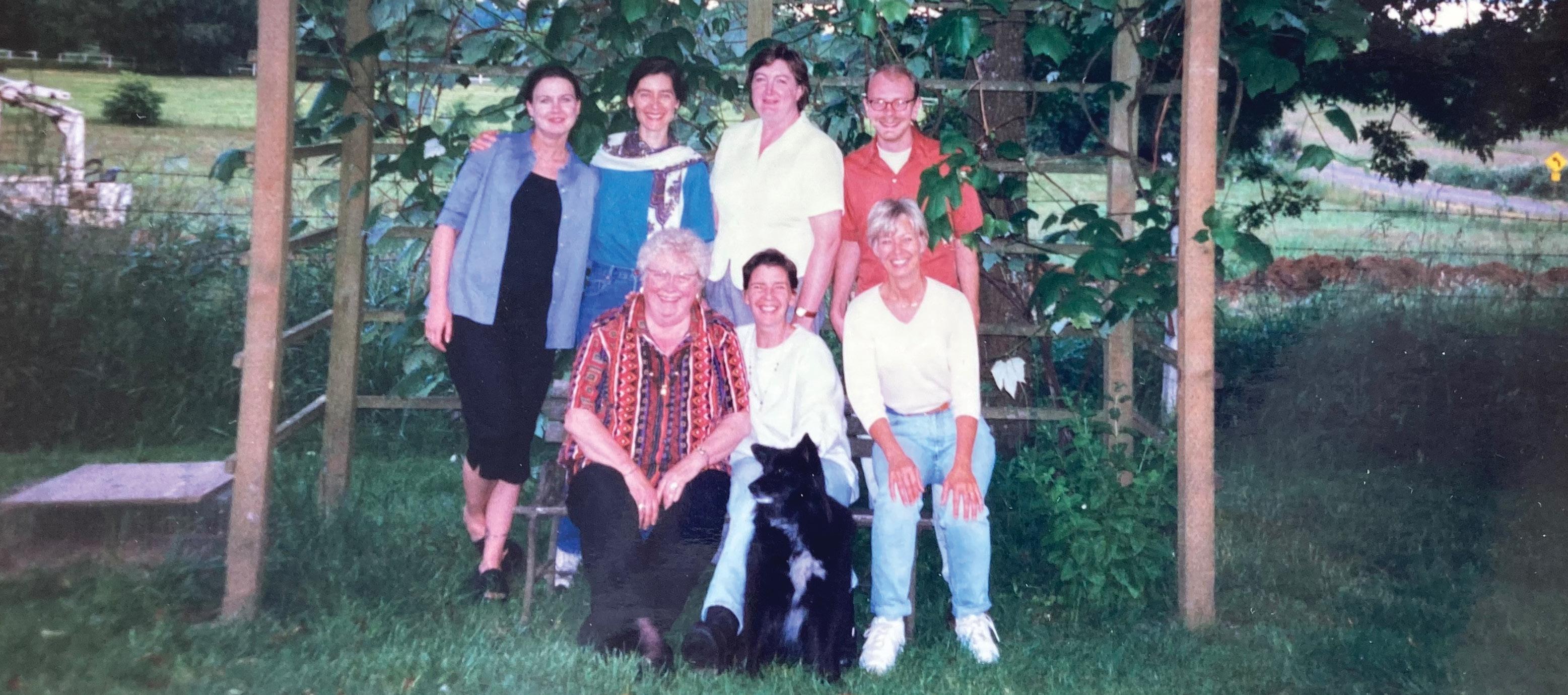 Back row left to right: Connie Karr, former Executive Assistant, now, Tilth’s Certification Director; Anne Plato, former Processing Program Reviewer; Lori Cozby, former Accounts/Finance Manager; Chris Schreiner, former Farm Coordinator, now, Tilth’s Executive Director. Front row left to right: Yvonne Frost, former Executive Director; Patti Conway, former Processing Program Coordinator; Jane Archer, former Education and Garden Coordinator.
Back row left to right: Connie Karr, former Executive Assistant, now, Tilth’s Certification Director; Anne Plato, former Processing Program Reviewer; Lori Cozby, former Accounts/Finance Manager; Chris Schreiner, former Farm Coordinator, now, Tilth’s Executive Director. Front row left to right: Yvonne Frost, former Executive Director; Patti Conway, former Processing Program Coordinator; Jane Archer, former Education and Garden Coordinator.
8 GROWTH & IMPACT REPORT - OREGON TILTH
Connie Karr (left) and Heather Smith (right) at Expo West in the early 2000s.
I often tell stories of how organic certification used to be. I like to show the copy of the first Oregon Tilth Standards, a 20-page document of criteria, mostly for growers, and our first Oregon Tilth Directory with 50 growers certified. Today, we have global and national standards and regulations that total hundreds of pages. It has been exciting and rewarding to be part of the growth of this label. I continuously reflect on the people that I have had the chance to learn from

As the Certification Director for the past ten years, I utilize all of my knowledge from working in various positions to understand the challenges and needs of the organization and industry. I advocate in the industry for strong standards, for sound and sensible approaches, and strong oversight. For the past few years, I have served as chair of the Accredited Certifiers Association (ACA) working to support all certifiers and bring collaboration and consistency in organic certification. Serving in this capacity has been one of the most rewarding moments in my career. It is truly inspiring when certifiers work together to help support each other and increase consistency – thereby strengthening the standards.
One of the most rewarding parts of my job is looking out at the entire industry and seeing the people who worked for Oregon Tilth sometime over the last 25 years. The amazing people who are passionate about organic agriculture and truly protecting the integrity behind the certification mark is what drives me to show up every day.
I have held many different jobs at Oregon Tilth. I have worked directly with producers, processors, accreditors and just about everyone in between. It is our people and our approach that is unique to certification.
While certification is our largest program it is not exclusively what we do – we also work in advocacy and education, and it is the trifecta of these three disciplines that make our services special. At Tilth, certification is education.
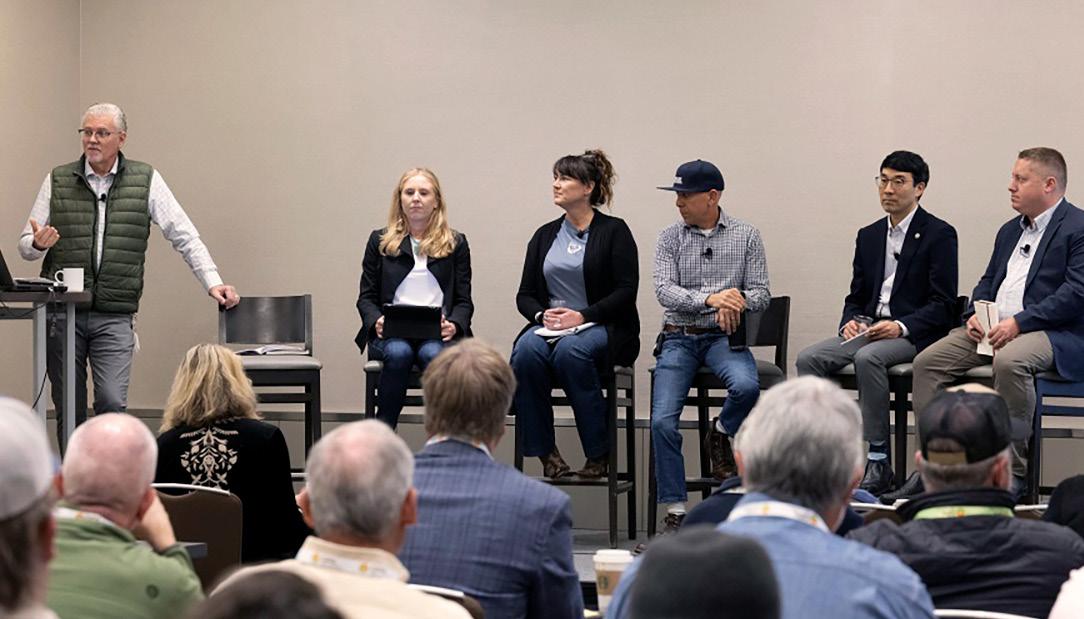
We do not look at ourselves as regulators, but rather advocates and support along the certification journey. This ends up providing a unique service experience – one with support and education.
After 25 years, my love for Oregon Tilth and this community continues to grow. I am often asked what has kept me here and inspired for 25 years. The answer is the same each time – it is the people! The staff I get to work with every day, the people who I got to work with at one time, the farmers, the operators, the clients and the industry advocates who inspire me and have an impact on me.
9 GROWTH & IMPACT REPORT - OREGON TILTH
Cheers to #TilthNation and looking forward to continuing that impact for 25 more!
Get Ahead of the Curve and Avoid Regulatory Speedbumps panelists pictured left to right: John Foster, Emily Musgrave, Connie Karr, Jake Evans, Robert Yang, and Tom Chapman. Photo credit: Organic Produce Network
Oregon Tilth Certified Organically Grown Standards and Guidelines handbook and historical documents on display.
INVESTING IN ORGANIC INTEGRITY

SHAPING ORGANIC CERTIFICATION TRAINING

The United States Department of Agriculture (USDA) National Organic Program’s (NOP) Organic Integrity Learning Center (OILC) provides professional development and online training for organic professionals. This free training center serves the entire organic industry, offering training specific to reviewers, certifiers, inspectors, producers, staff of certified operations, and others serving in compliance and enforcement roles. Last year, Oregon Tilth had the honor of creating two new educational courses for the OILC.
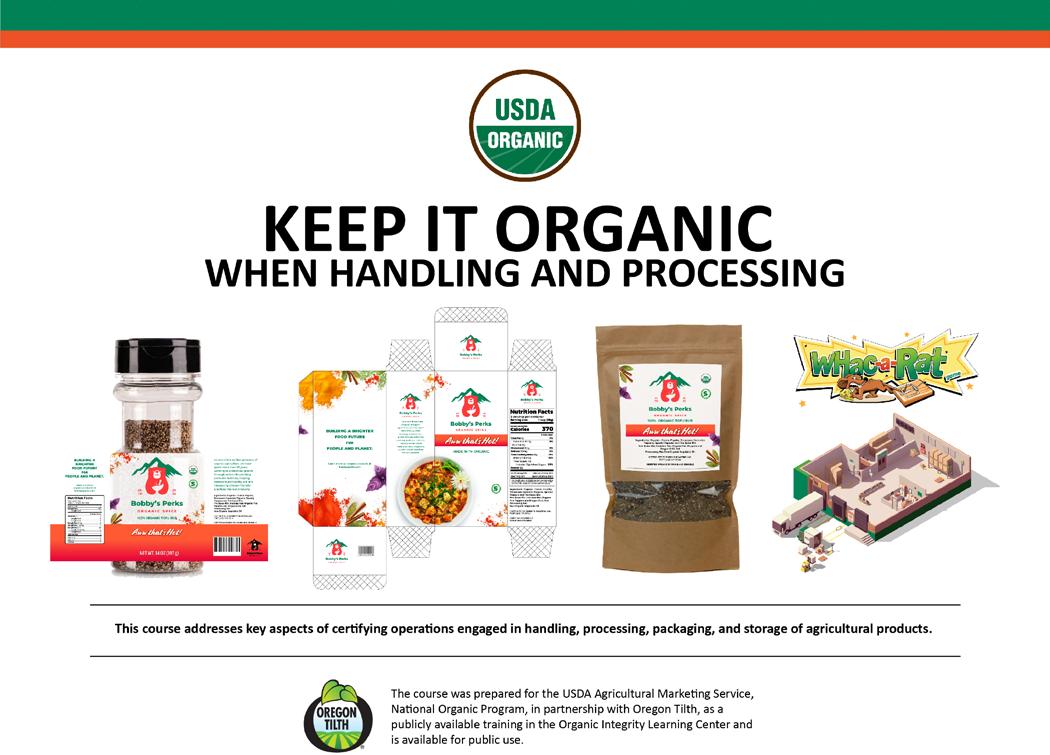
Oregon Tilth’s Certification Director, Connie Karr, recognized the need for more substantial handler training in the OILC, and saw this as an opportunity to engage Tilth’s expertise in working with handling operations. During discussions with the NOP about this first course, Tilth was asked to consider making a second course focused on inspections due to the proficiency of Tilth’s inspections department.
The effort to create the OILC handling and inspection courses was a true cross-departmental initiative, leveraging the diverse skills of the certification, inspection, quality and accreditation, education, client services, finance, and marketing and communications departments.
10 GROWTH & IMPACT REPORT - OREGON TILTH
STORAGE AREA
USDA NOP Handling and Processing training course introduction screen.
Oregon Tilth collaborated on the OILC handling course, creating the interactive game “Whac-A-Rat.” The training helps maintain organic standards and safety by addressing pest concerns in different scenarios.
Ben Bowell Education and Advocacy Deputy Director

HANDLING COURSE
The innovative OILC Handling Course created in partnership with the NOP is designed to train inspectors, reviewers, and others on accurately assessing the compliance of handling and processing operations.
The course is comprised of five focused lessons.

1. Introduction and Defining Handling Scope: An initial exploration into what needs to be certified and what is exempt, along with specifics of on-farm processing.
2. Commingling Prevention: A deep dive into strategies for preventing commingling at various stages, including receiving, storage, and processing.
3. Contamination Prevention: A comprehensive guide to protecting organic integrity in processing facilities that use synthetic sanitizers and cleansers to maintain food safety.
4. Pest Management: An examination of effective pest control strategies within processing facilities.

5. Product Composition and Organic Content Calculation: A detailed study focused on recordkeeping, verifications, and the analysis of more complex formulations.
We embedded key terminologies, concepts, and multimedia examples to create a comprehensive and engaging learning experience.
Lindsey Campbell Technical Specialist
“As you’re going through the OILC handling course, you can visualize the path from regulation through OTCO’s understanding and how we have created the modular Organic System Plan (OSP) forms to ask questions in a way that translates regulatory language into the context that processors can understand or relate to. This in turn helps handlers successfully manage their organic systems in a way that is compliant and moves the industry forward by ensuring organic integrity. Having a centralized system all certifiers can learn from helps ensure consistent implementation of the regulations,” said Technical Specialist Lindsey Campbell.

11 GROWTH & IMPACT REPORT - OREGON TILTH
“Education is not just done by individuals on the Education Team,” said Deputy Director of Education and Advocacy, Ben Bowell. “It was really nice to highlight the expertise across the organization.”
Does Margaret see what I see behind her?
Kurt Belser Inspections Manager
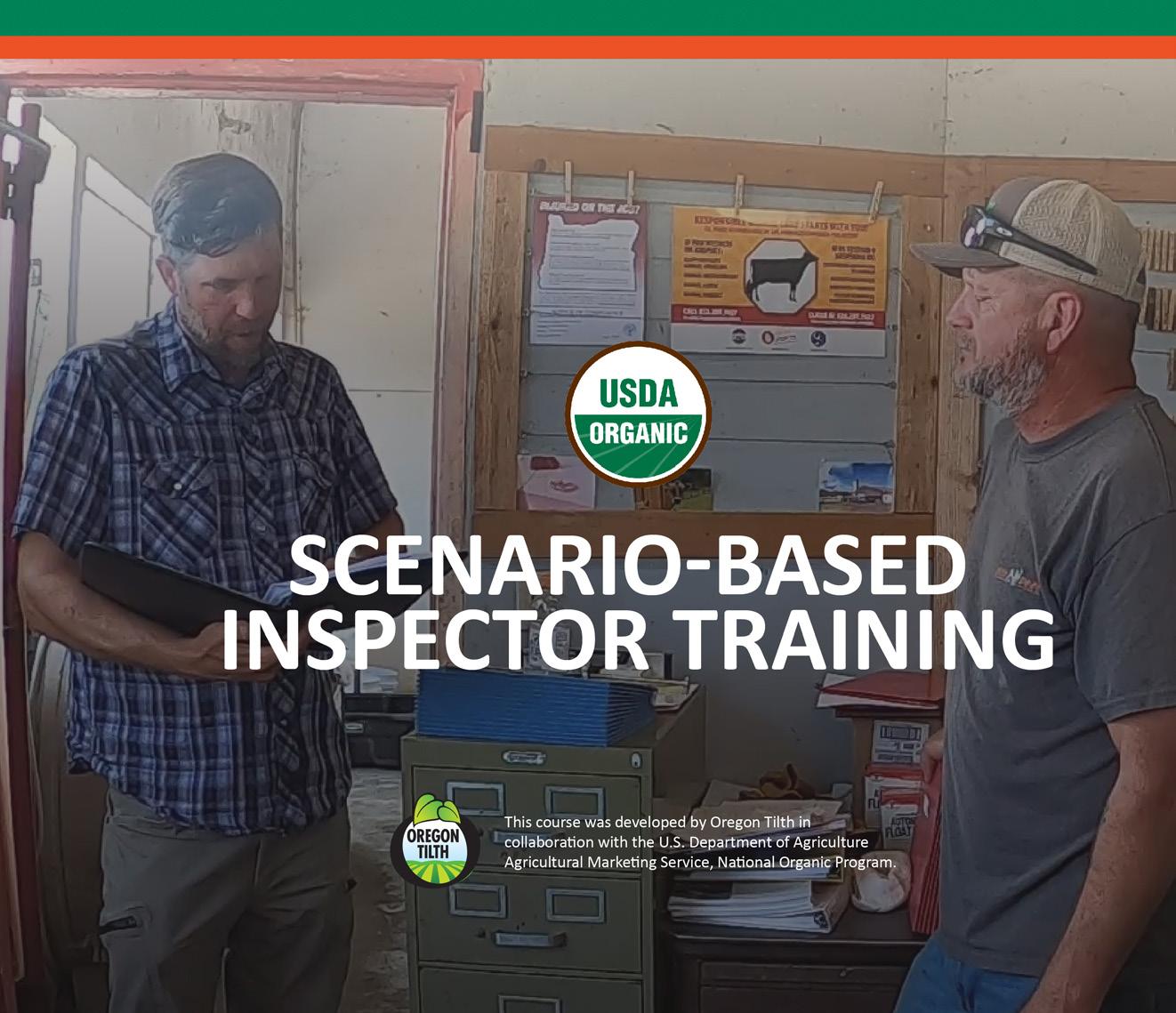

“The opportunity to not only improve the work of our organization but the industry as a whole is a great responsibility and a foundational part of what Oregon Tilth Certified Organic (OTCO) stands for. Participating in the collaborative effort of developing the OILC ScenarioBased Inspector Training Course is a perfect representation of our values of continuous improvement and feedback. It is through those values that we will see the organic seal continue to be the gold standard of certifications,” said Inspections Manager Kurt Belser.
Edward Johnson, Communications and Marketing Deputy Director


“I was excited to be asked to help create training materials for the OILC by providing video of a crop inspection with a real farmer. I depend on the OILC to create and present content that helps me hone and increase my skills as an organic crops and livestock inspector for OTCO. I find OILC’s content to be fresh, relevant, and professionally done. The farmer and I had a great time setting up shots on her beautiful farm and filming our conversations about crop inspection. I hope the content I provided can help OILC create meaningful courses that help other inspectors and certifiers meet their training goals,” said Inspector Margaret Liddiard.
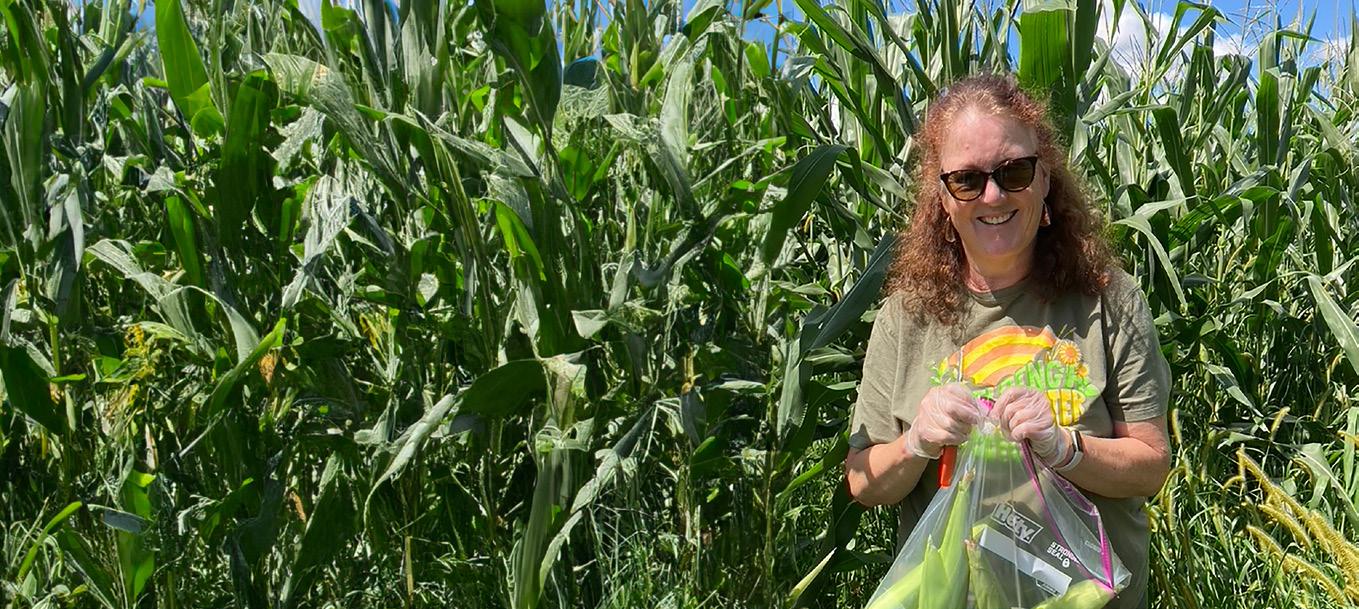

“In partnership with the USDA NOP, Oregon Tilth is enhancing the organic industry’s integrity by breathing life into innovative OILC courses. By weaving authentic stories and diverse visuals into our education, we’re empowering Oregon Tilth’s staff, inspectors, and farmers with not just valuable knowledge and skills, but also fresh perspectives,” said Communications and Marketing Deputy Director Edward Johnson.
Margaret Liddiard Inspector

12 GROWTH & IMPACT REPORT - OREGON TILTH
USDA NOP Scenario-Based Inspector Training Course introduction screen.
Labeling Categories and Composition Requirements lesson part of the OILC Handling Course.
Margaret Liddiard’s collaboration with a farmer for OILC’s training materials benefits inspectors and certifiers in the field of organic inspection.
SCENARIO-BASED INSPECTOR COURSE


Oregon Tilth’s staff and clients joined forces to create a scenario-based inspector video training rooted in real-world experiences. The course covers a spectrum of certification aspects, offering a comprehensive guide useful to inspectors at every level of experience.
“Turning real-world scenarios with farmers into teachable content for inspectors and others in the industry helps develop the necessary skills we use every day,” said Oregon Tilth Senior Inspector Matthew Molyneaux. “Working collaboratively with the USDA NOP to provide these training opportunities for current and future organic inspectors was a great experience to show what I do day-to-day in the field with farmers.”

As an inspector with over 20 years of experience in the organic industry, Senior Inspector Amy Stafford was thrilled to be a part of the course creation. “I was honored to participate in developing training exercises for the next generation of inspectors,” said Amy. “There is such a value in having strong and consistent training materials.”
“In 2022 and 2023 Oregon Tilth certification staff spent over 4,675 hours training. Training includes education on regulatory updates, material review refreshers, administrative procedures, customer service, and more,” said Quality and Compliance Manager Michelle Kozlowski.


Oregon Tilth’s investment in continuous education supports consistent and transparent organic certification practices. At the heart of organic certification is education. The enforcement and fulfillment of rules, regulations, and practices is dependent upon the ability of operators and professionals to comprehend and implement the organic standards. We share information daily to support successful operations and encourage continuous improvement in the organic community.

These courses could not have been created without the coordination, time, and effort of our clients. To our clients who helped make this possible – thank you!

13 GROWTH & IMPACT REPORT - OREGON TILTH
Matthew Molyneaux Senior Inspector
Amy Stafford Senior Inspector
Michelle Kozlowski Quality and Compliance Manager
INNOVATION THROUGH DATA
STRENGTHENING THE ORGANIC SECTOR
Oregon Tilth’s new dashboards are accessible and functional.
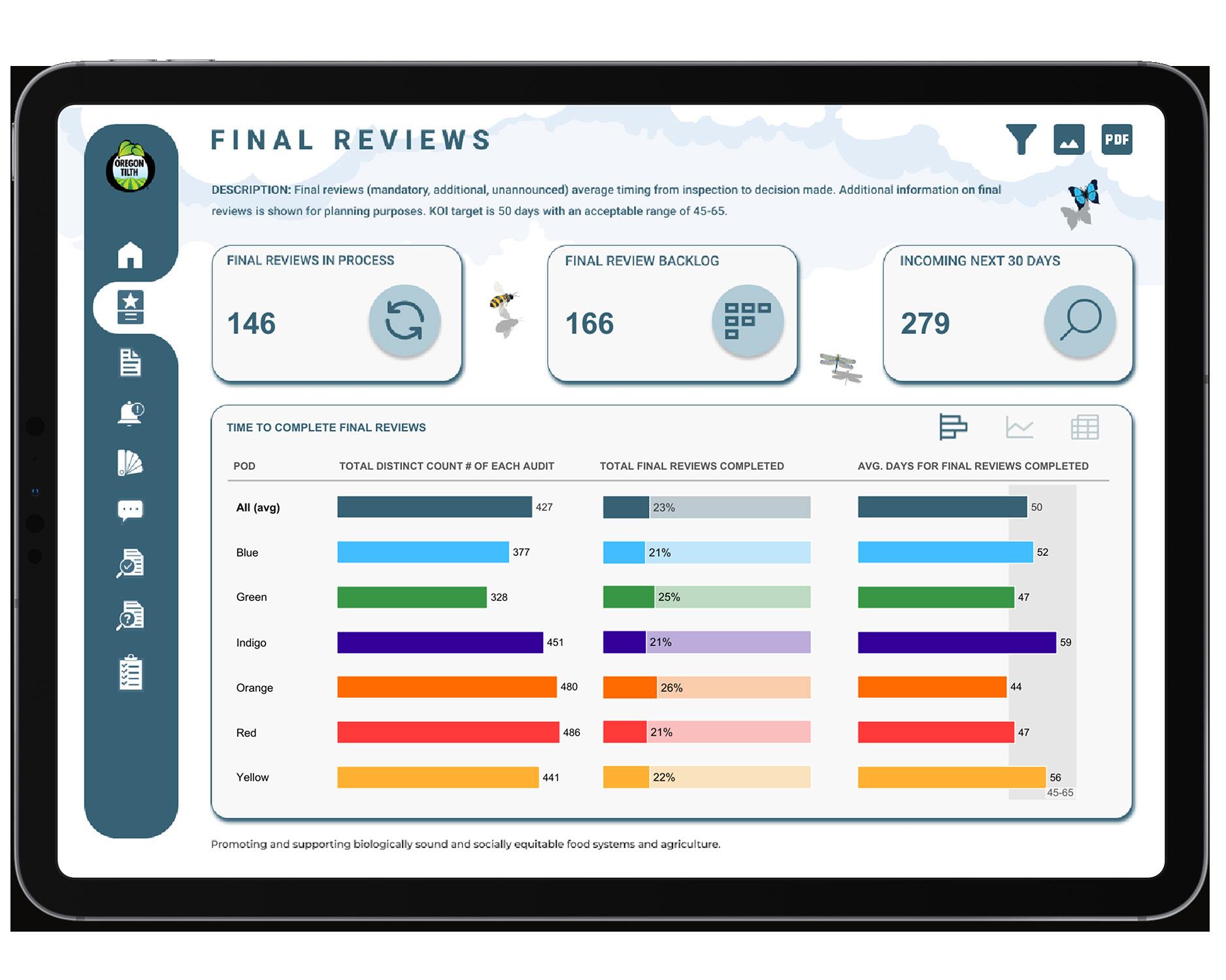
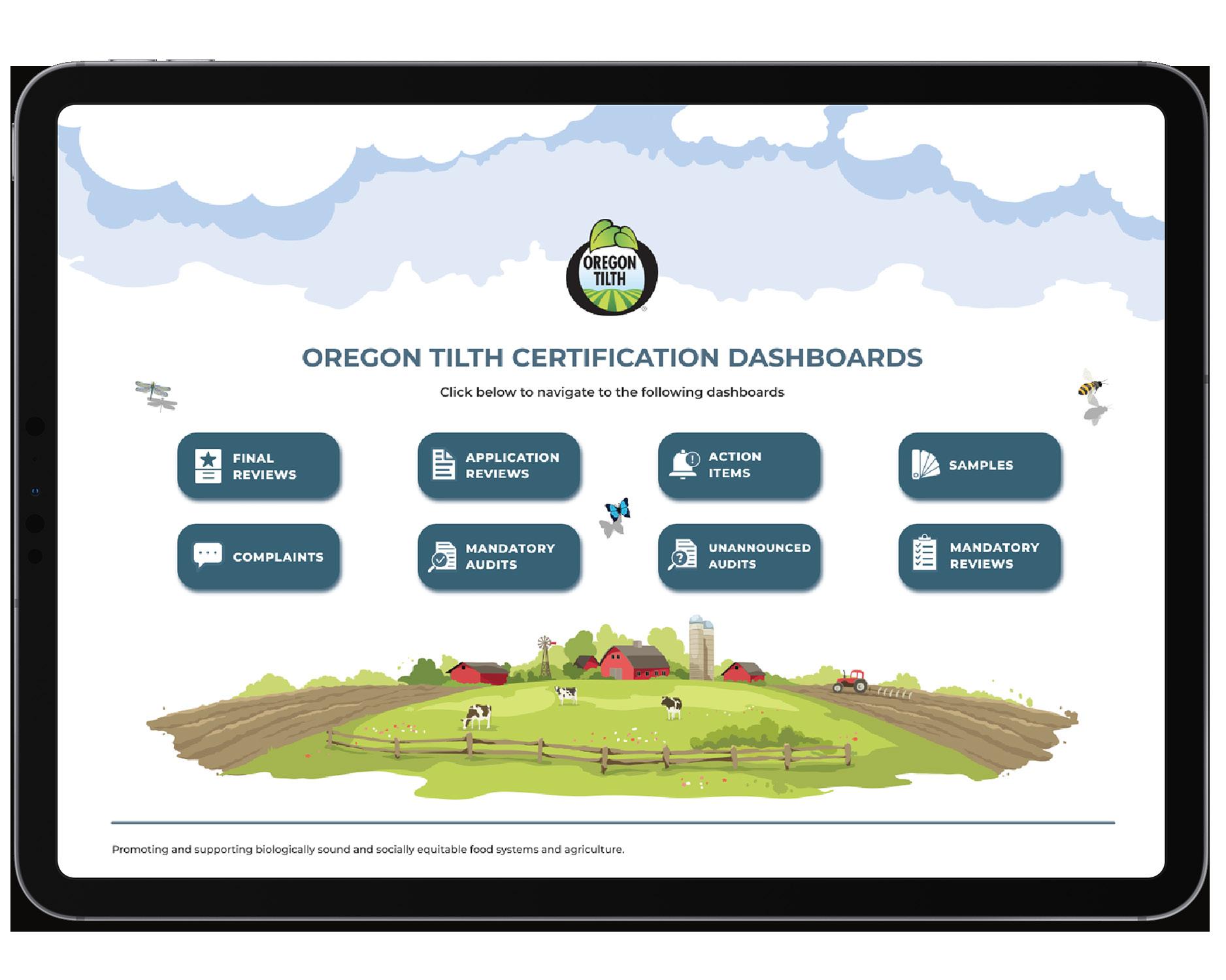
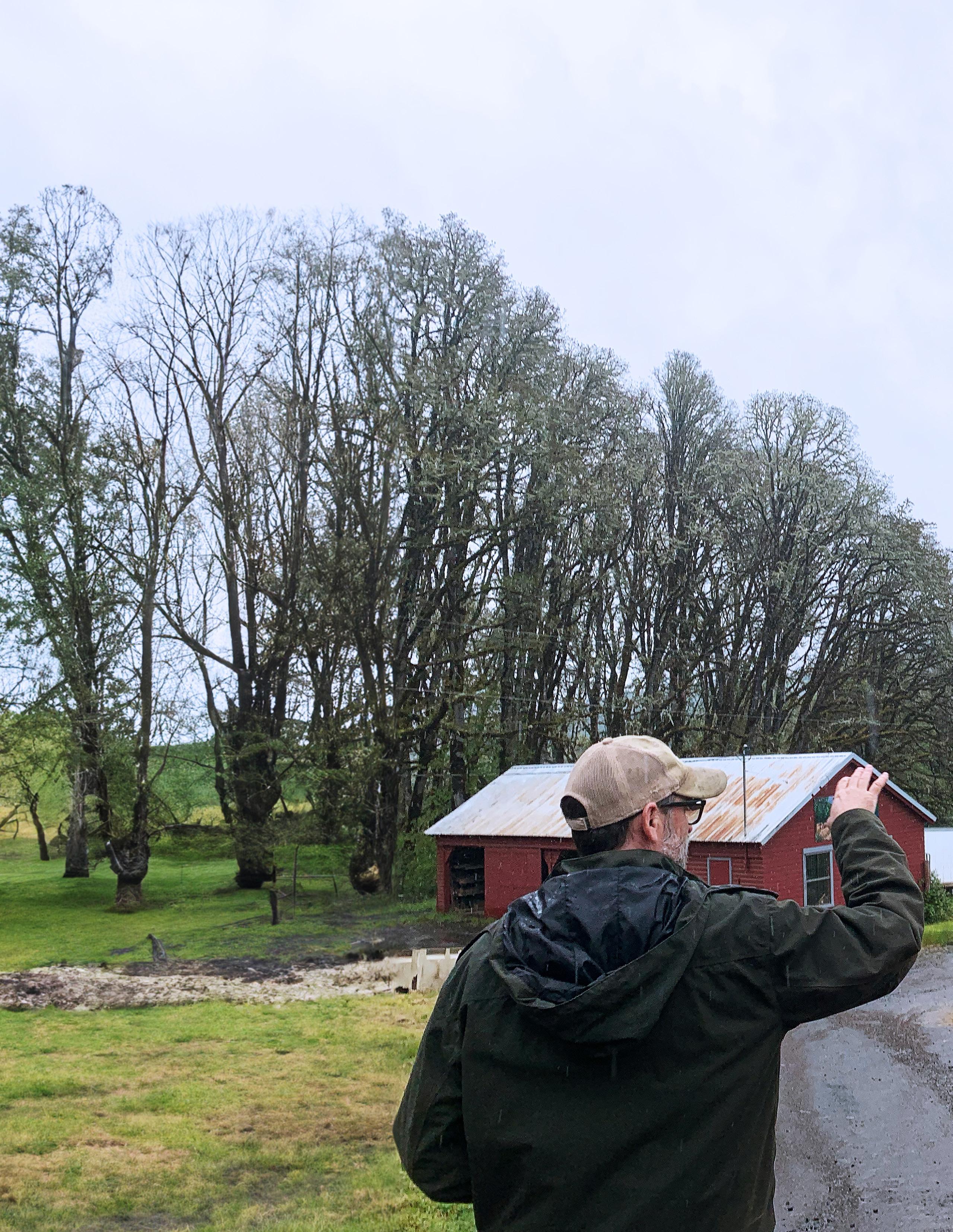
14 GROWTH & IMPACT REPORT - OREGON TILTH
Leonard Freeman, Jr. Managing Director

At Oregon Tilth, we believe sustainable and ethical practices promote the health and well-being of people and the planet. Using data to measure the impact of our practices and make more informed decisions provides deeper insight into the effectiveness of our operation, helping us identify areas of strength and opportunity for improvement.
 Heather Smith IT Director
Heather Smith IT Director

We track key metrics associated with customer service, client acquisition and retention, financial health, grants and partnerships, and organizational health. This information supports development of targeted strategies to enhance customer service, improve operations, and expand our reach.

The partnership between Oregon Tilth’s Managing Director, Leonard Freeman, Jr., and Tilth’s IT Director, Heather Smith, is a critical part of our success with data. Leonard approaches data from a community-building and visionary lens, focusing on the big-picture impact of data on our mission and values. Heather brings a strategic, technical, and organizational perspective, focusing on the practical applications of data to optimize operational efficiency and support organizational goals. Together, they have developed a holistic approach to data that supports both long-term vision and day-to-day operations.
This year, we enhanced our data collection and streamlined our reporting and metrics capabilities by implementing Tableau dashboards, a product of Salesforce. Our new approach to data visualization helps make data more accessible and functional to everyone involved. With our update, we have real-time, trusted data that pinpoints essential information easily. Our dashboards display crucial data such as timely certification services, concerns, and samples and material reviews. The new technology simplifies our staff’s process in obtaining information, with the ultimate goal of serving our clients more effectively and efficiently.
Innovation through data is essential for the continued growth and success of sustainable agriculture. By embracing data, we strengthen our commitment to promoting a healthier and more resilient future for all.

15 GROWTH & IMPACT REPORT - OREGON TILTH
Chris Overbach, Winter Green Farms and Franklin Smith, Oregon Tilth
+
Noti, Oregon
CONSERVATION EDUCATION
OREGON TILTH AND NATURAL RESOURCES CONSERVATION SERVICE’S 13 YEAR PARTNERSHIP
Oregon Tilth formed a contribution agreement in 2010 with the United States Department of Agriculture’s Natural Resources Conservation Service (NRCS) to increase conservation on organic farms. Oregon Tilth has since had the opportunity to work with NRCS on a variety of projects and initiatives across the country.
Helping NRCS staff better understand organic systems, regulations, and practices supports the ultimate objective of increasing support for organic producers in meeting or exceeding their conservation goals.
Our partnership with NRCS directly contributes to our mission of sharing knowledge and supporting social and environmental sustainability in our food system.
Research shows that organic practices increase soil organic matter, microbial biomass and diversity, and provide greater yield stability in times of extreme weather1
Oregon Tilth’s Education Specialist, Marina Oriel, organizes and provides technical trainings and resources for NRCS staff, producers, and other audiences with the goal of increasing conservation on organic farms.
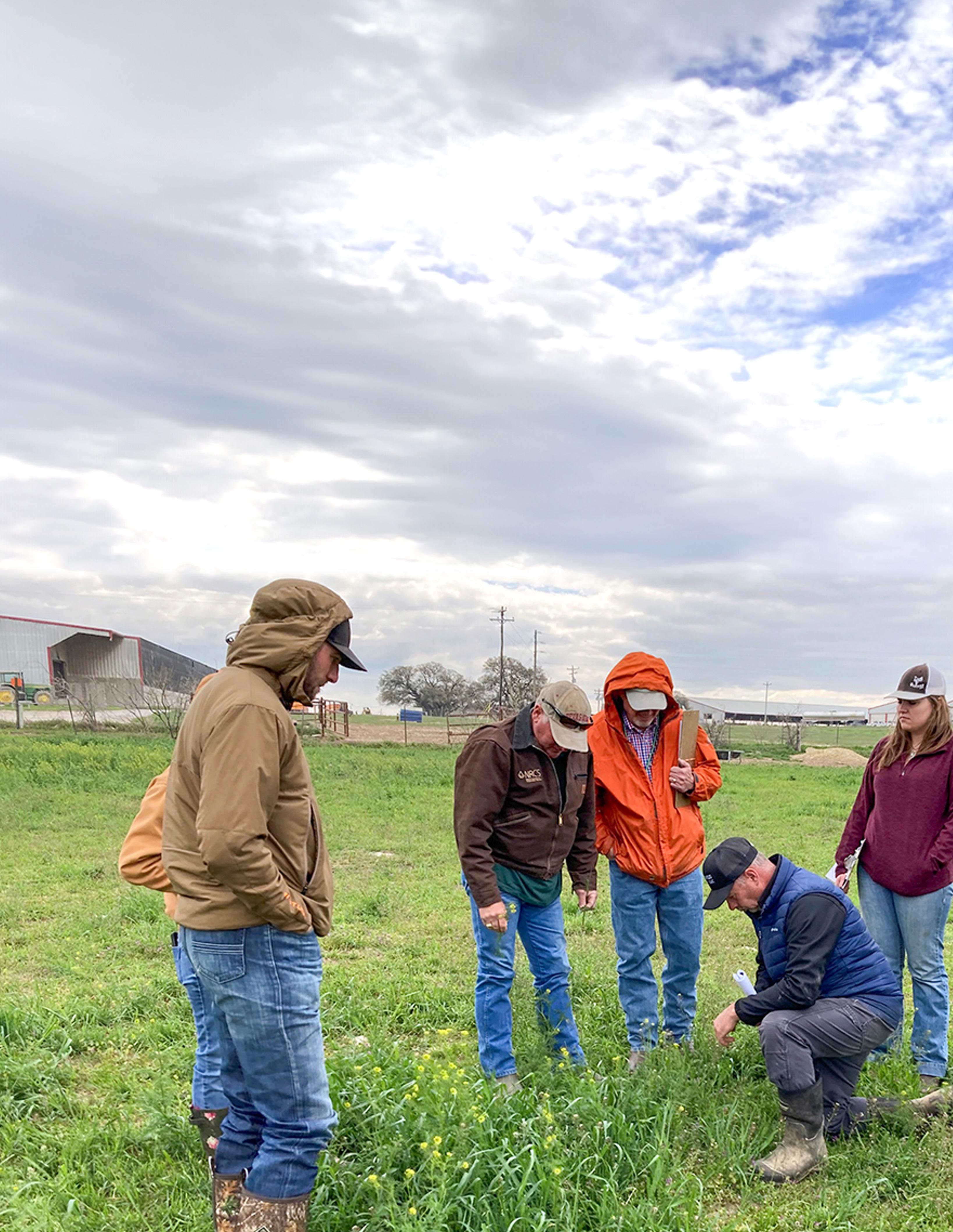
16 GROWTH & IMPACT REPORT - OREGON TILTH
NRCS
OTCO Client Postmus
Dublin,
Farm Tour at
Dairy in
Texas.
170 TRAININGS to over

5,000 NRCS STAFF & PARTNER AG PROFESSIONALS in 42 states
68 NATIONAL WEBINARS with over 16,000 PARTICIPANTS

82 WORKSHOPS to over
4,500 PRODUCERS & INDIVIDUALS on conservation in organic systems & NRCS programs
To date, Oregon Tilth has provided training and education in several different formats. The Working Effectively with Organic Producers course helps NRCS staff meet their conservation planner certification requirements. General organic training and field visits help to expand their knowledge of organic systems and comfort level working with organic producers. Recently developed print resources have included an organic crop rotation guide, an organic myths and facts document, guidance for NRCS staff on how to work with organic producers, organic certification basics, and organic farmer-facing flyers on how they can receive assistance from NRCS.
When NRCS staff feel confident in their ability to work with organic producers, they can build community, support a future of sustainable food production, and implement conservation practices that enhance natural resources and protect biological diversity.

We measure our impact in this work by evaluating a change in knowledge of organic systems, resources, and ways NRCS staff can work with organic producers. We also look at changes in attitude like improved confidence and comfort level when working with organic producers.
“This was one of, if not the best virtual trainings I’ve had since COVID started 2 years ago. I had some preconceived ideas if organic production could work in the Southeast but I now know I was wrong and look forward to opportunities to try and assist any organic producers who come my way.”
“Overall, I thought the training was fabulous and I learned a great deal about organic farming and the people that make it happen. I believe I will communicate better with organic producers after taking this course.”

Interested in connecting with Marina about conservation work in organic?

Email edteam@tilth.org for more information and/or to connect.

17 GROWTH & IMPACT REPORT - OREGON TILTH
Marina Oriel Education Specialist
1 “Farming Systems Trial.” Rodale Institute, 9 Dec. 2022.
BUILDING A BRIGHTER FOOD + FIBER FUTURE

The Global Organic Textile Standard (GOTS) ensures that textile products from medical cotton swabs to mattresses meet strict organic sourcing, organic production practices, and fiber composition requirements. This is accomplished through environmentally and socially responsible manufacturing all the way to labeling in order to provide credible assurance to the end consumer.

In addition to product composition requirements, GOTS also has requirements for the environmental impact and the social welfare criteria of the production of GOTS goods.
GOTS is owned by shareholders across the globe, including the Japan Organic Cotton Association, Organic Trade Association, Soil Association, and International Association Natural Textile Industry who work with GOTS Staff to manage the Standard implementation and revisions, which happen every three years.

THE GLOBAL ORGANIC TEXTILE STANDARD (GOTS) IS MORE THAN JUST A PRODUCT STANDARD – IT IS AN INTERNATIONAL SYMBOL OF SUSTAINABILITY AND ETHICAL PRODUCTION.
FINISHED PRODUCT SEWING
GIN SPINNER 18 GROWTH & IMPACT REPORT - OREGON TILTH Organic Certified by OTCO
COTTON FABRIC MILL
FACTORY DYE HOUSE
The Oregon Tilth Fiber & Textile Team certifies almost all organic cotton gins within the United States. Our Fiber & Textiles team is uniquely dedicated to GOTS, which is uncommon among certifying bodies. Small but mighty, this team is a business’s go-to resource for GOTS certification, guiding them through each step of the process.



The team helps guide businesses through the standard.



Elizabeth Tigan, Oregon Tilth’s Fiber & Textile Specialist, brings over 20 years of organic experience and is a member of the GOTS Certifiers Council. Elizabeth also represents Oregon Tilth as the Vice Chair of the Organic Trade Association’s Fiber Council, that works to strengthen and grow the organic fiber and textiles sector. Shana Meshbesher, Oregon Tilth’s Fiber & Textile Certification Officer, brings more than 13 years of organic industry experience and is charged with providing support to clients and inspectors. Aaron Turner is the Certification Services Manager with over 20 years of certification experience and manages the team and provides program support, oversight, and development. With such experienced and knowledgeable staff, businesses can rest assured that they are in good hands with Oregon Tilth.

Oregon Tilth has the opportunity to certify producers throughout the entire GOTS supply chain. We see real perseverance by every one of our clients in the face of adversity. From bad weather and small crop productions with our gins in the South to shipping and supply uncertainty with our manufacturers, our clients continue to persist in the name of organic textiles. Through all of the hardships, there is one thing for certain: people want more organic textiles and they are increasingly concerned about climate and environmental impacts as well as social welfare criteria.
GOTS is a one-stop shop to fulfill all of these optimal goals. Certification to GOTS helps show compliance with each of the 17 Sustainable Development Goals of the United Nations – and that’s something that benefits us all!
19 GROWTH & IMPACT REPORT - OREGON TILTH
Shana Meshbesher Fiber & Textiles Certification Services Officer
Elizabeth Tigan Fiber & Textiles Specialist
Aaron Turner Certification Services Manager
St. Peter Woolen Mill St. Peter, Minnesota
LATIN AMERICA IMPACT
Oregon Tilth currently certifies over 140 operations and more than 51,000 organic acres in Mexico to the LPO (Ley de Productos Orgánicos) and USDA NOP standards.
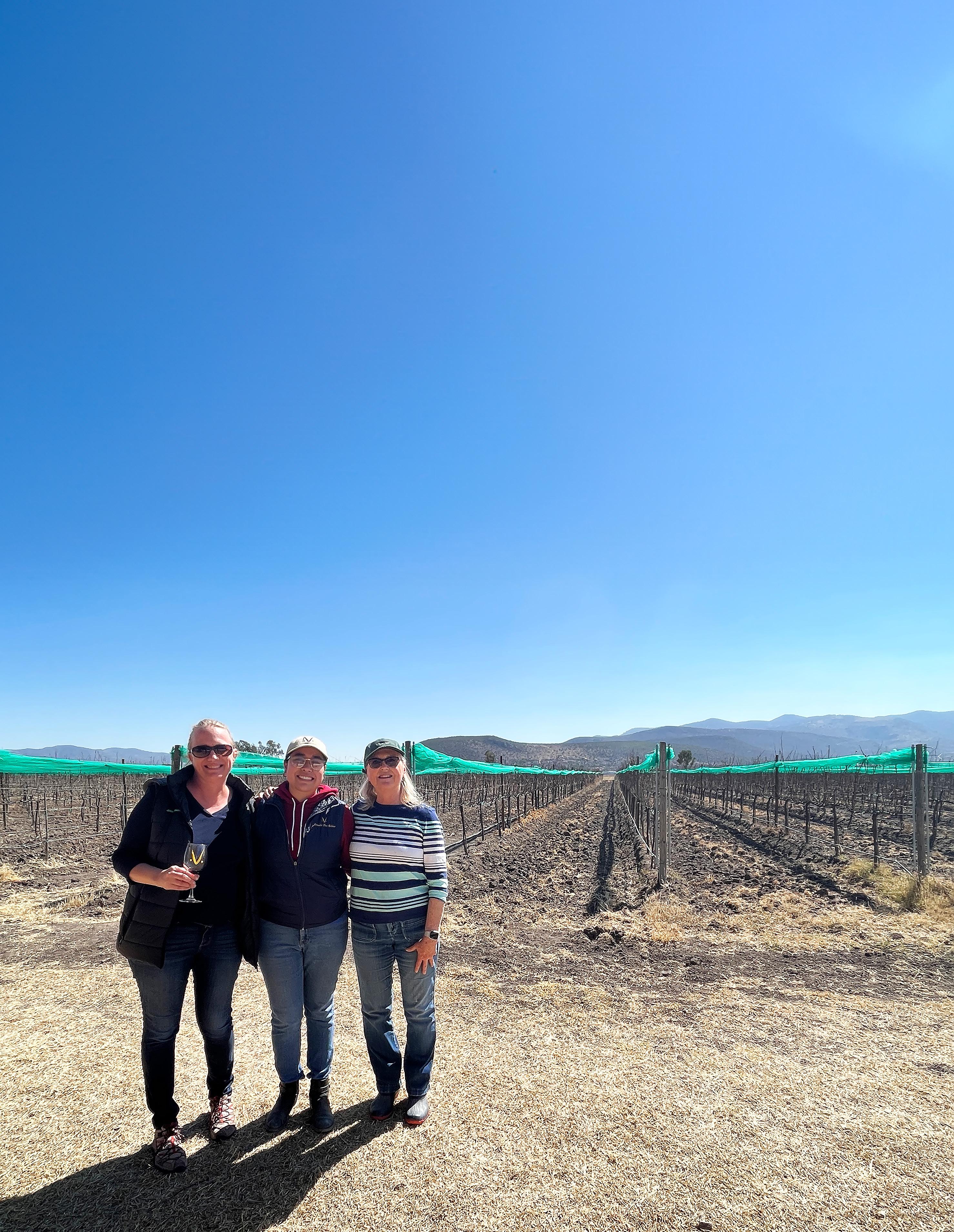
These operations are located across 30 Mexican states and produce a variety of products, including diverse vegetables, mangoes, avocados, garlic, herbs and grapes.
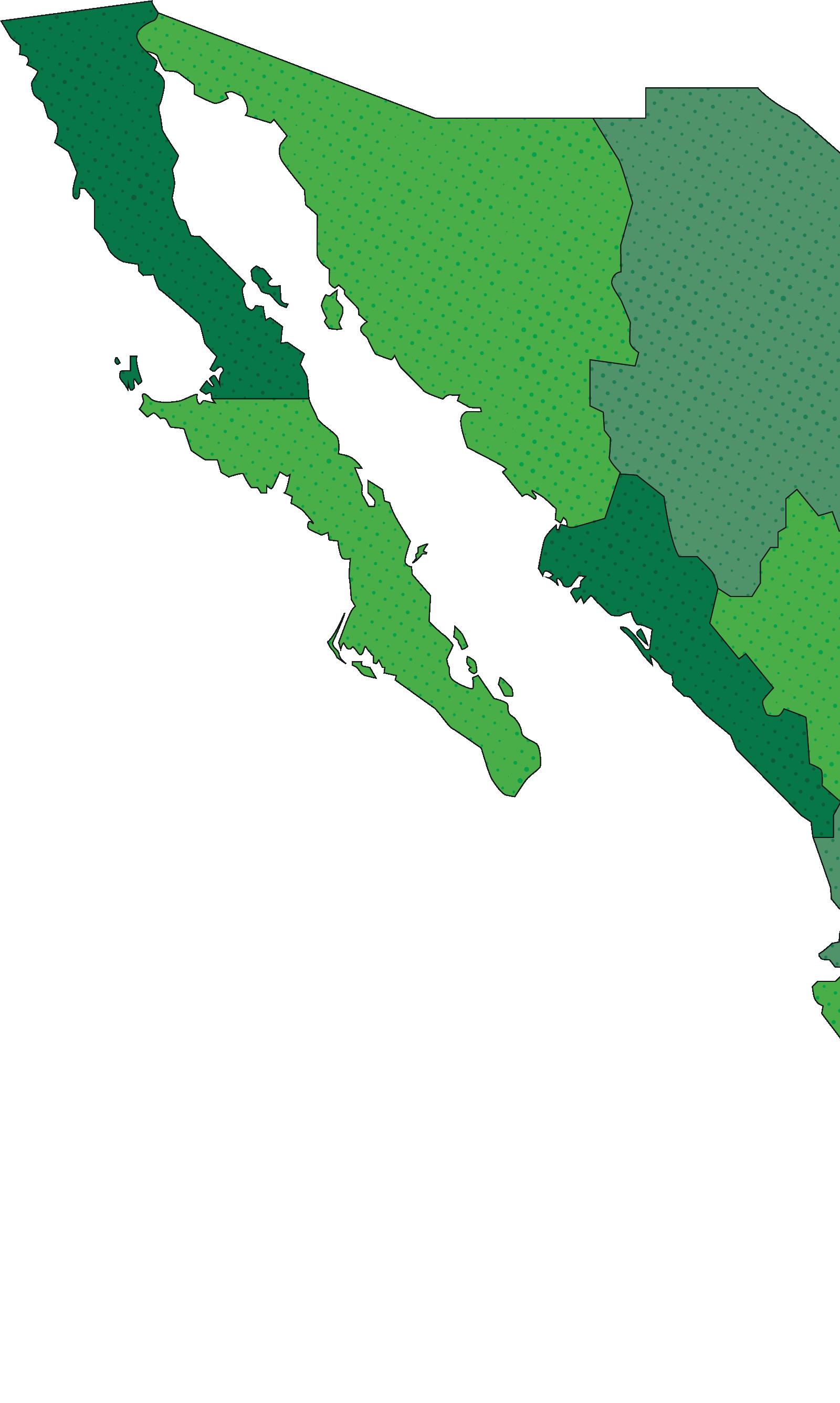
484 INDIVIDUAL PRODUCERS* MEXICO CENTRAL 73 69 CERTIFIED OPERATIONS INDIVIDUAL PRODUCERS* BAJA CALIFORNIA 21 204 CERTIFIED OPERATIONS INDIVIDUAL PRODUCERS*
CERTIFIED ORGANIC
147 CERTIFIED ORGANIC PRODUCTS 418
OPERATIONS
20 GROWTH & IMPACT REPORT - OREGON TILTH
Left to right: Oregon Tilth Senior Certification Officer Jenn Ungemach, tour guide Diana A. Gonzalez, and Tilth client Diane Maycotte at Bodega Dos Buhos in Guanajuato, Mexico.
CLIENT SNAPSHOTS
Jacobs Farm del Cabo:
The del Cabo collective was born in 1985, and unites small farmers across Baja California and mainland Mexico. As of 2023, del Cabo provides organic farming training and sustainable quality of life to 225 small farms within 18 different communities. Del Cabo produces over 30 varieties of vegetables and herbs for consumers in the USA and Canada.
Productos Rivera de Escuinapa:
A third generation organic mango growing, processing, and exporting operation. At peak season, Productos Rivera supports more than 500 people in their community, in addition to 10 other small farmers in the area.
MEXICO
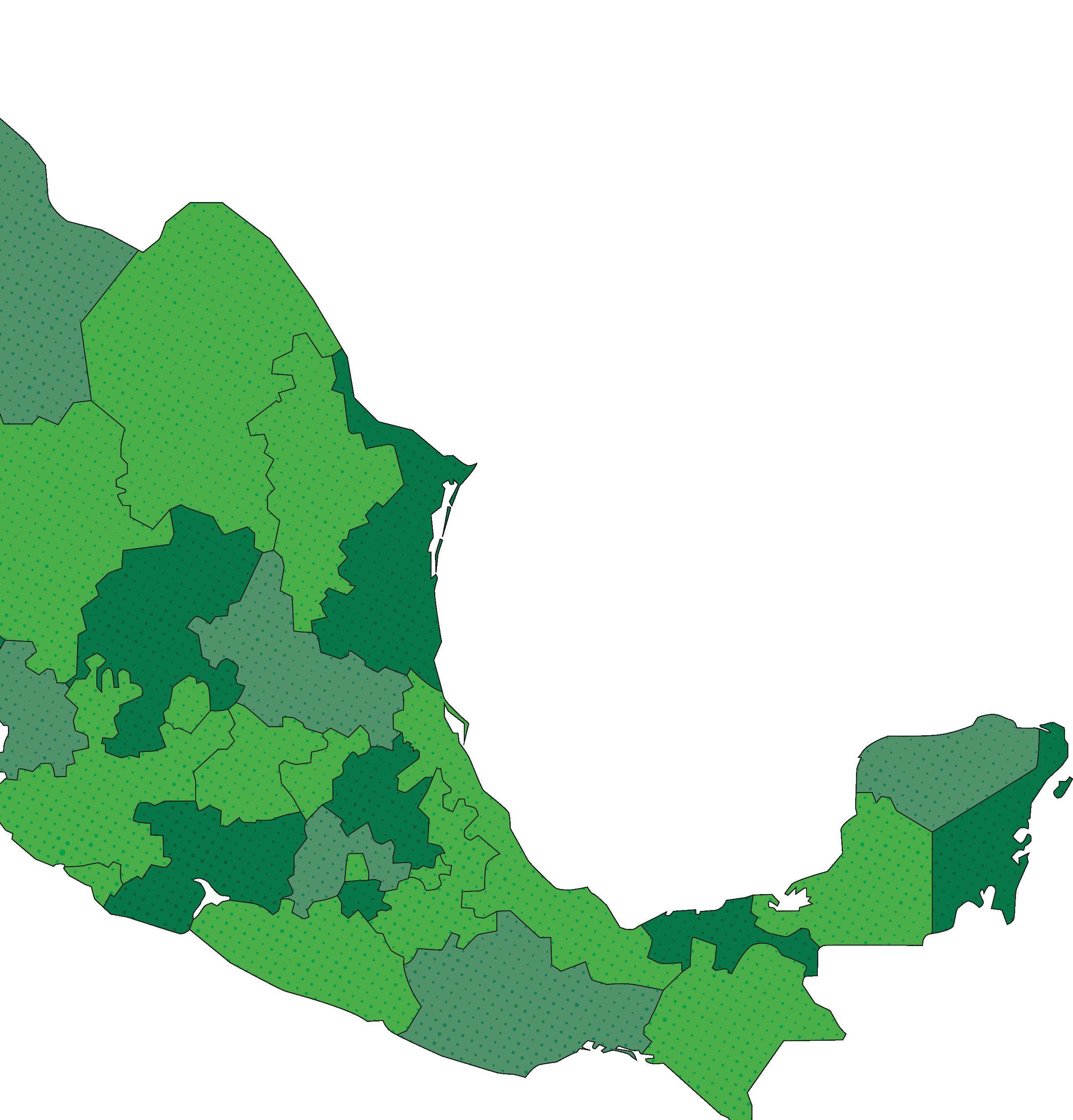

Bodega Dos Buhos:
A pioneer of organic viticulture in the state of Guanajuato. Dos Buhos has been growing grapes for more than a decade, and is involved in various social and environmental causes in their community.
Indicates the number of individual producers, which are part of groups or cooperatives of producers.
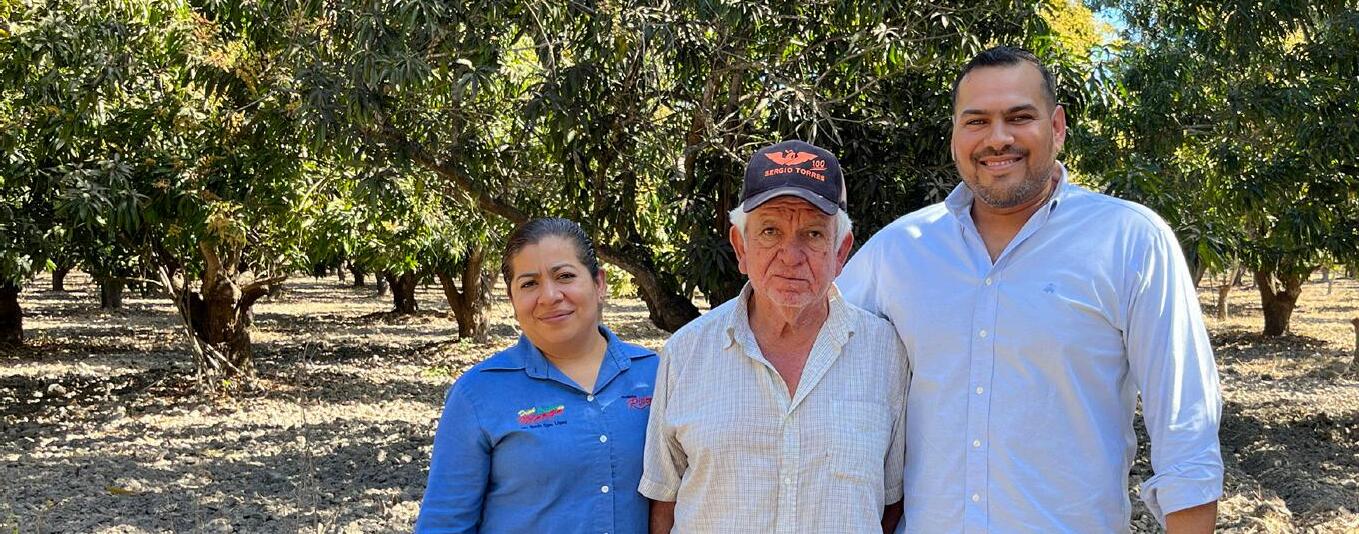
MEXICO SUR 2 31 CERTIFIED OPERATIONS INDIVIDUAL PRODUCERS* NORTE DE MEXICO 51 33 CERTIFIED OPERATIONS INDIVIDUAL PRODUCERS*
CERTIFIED ORGANIC ACRES
*
51,568
Left to right: Rocío Santín, Don Joaquin Salas, and Jorge Rivera
21 GROWTH & IMPACT REPORT - OREGON TILTH
THE TRANSITION TO ORGANIC PARTNERSHIP PROGRAM
Organic agriculture is a bright spot in our future, benefiting the environment, human health, economies, and communities.
Although there are many motivating factors to transition to organic, producers face barriers in the transition process. Farmers regularly cite challenges to transition, such as: navigating the complexity of the certification process, adopting organic recordkeeping requirements, learning new production practices, finding organic markets, and the prohibitive cost of certification.
To address some of the transition challenges, the United States Department of Agriculture (USDA) announced the new Transition to Organic Partnership Program (TOPP) in 2022.
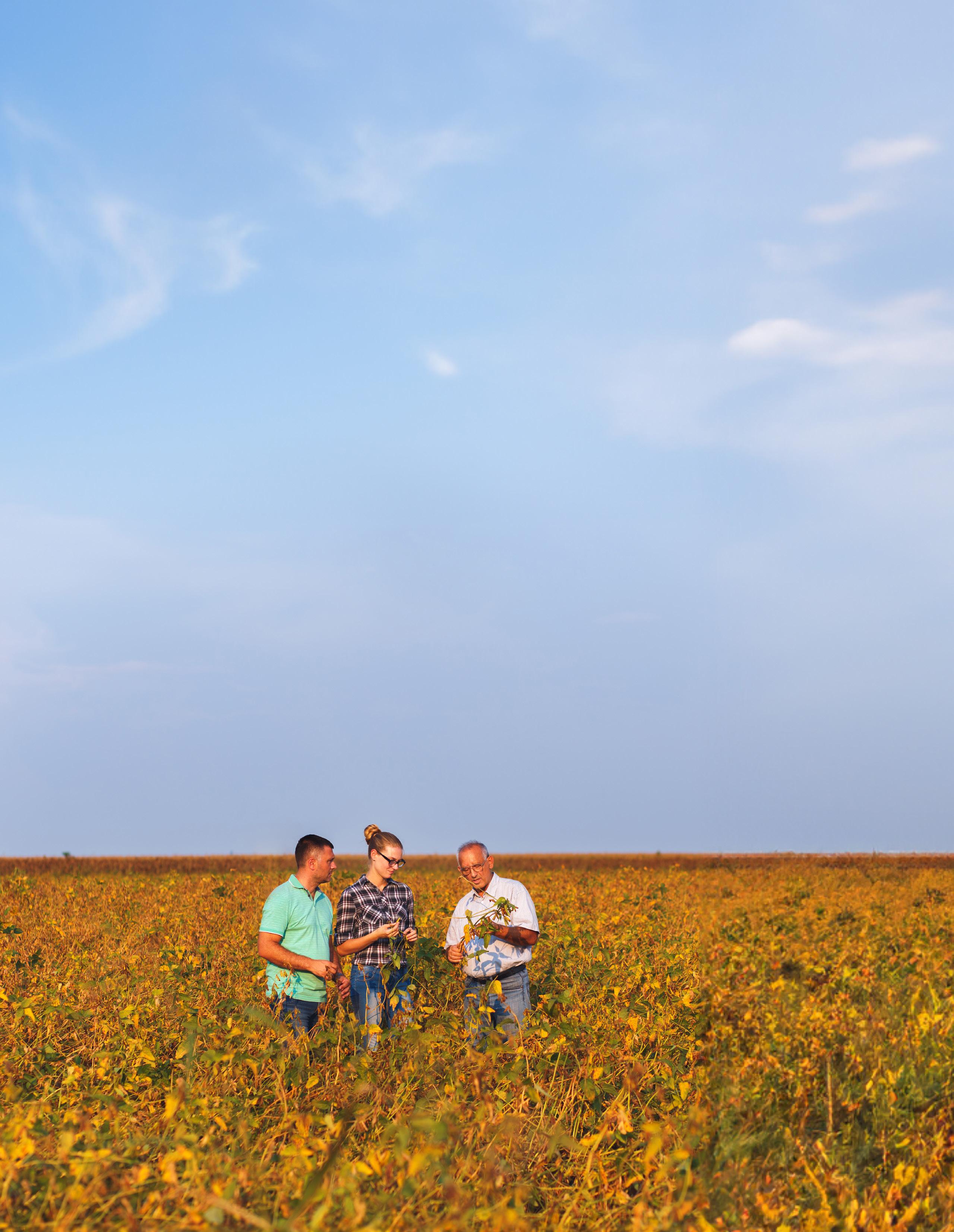
TOPP is investing up to $100 million over five years in cooperative agreements with non-profit organizations who will partner with others to provide education, technical assistance, and support to producers who are transitioning to organic. The goal of this initiative is to grow the organic sector by developing a robust support network for transitioning producers through farmer-to-farmer mentorship, technical assistance, and education.
Producers involved in this program will have opportunities to learn through mentorship with an experienced certified organic producer, work one-on-one with technical assistance providers in developing their organic system plan and preparing for certification, and connect with other transitioning and certified organic producers during transition-focused events and learning opportunities.
22 GROWTH & IMPACT REPORT - OREGON TILTH
Across the country, TOPP will:

• Connect transitioning producers with mentors
• Develop paid mentoring networks to share practical insights and advice
• Build support networks through educational and community events

• Provide technical assistance on topics such as organic system plans, certification, inspections, conservation planning, business development, regulations, and marketing
• Help producers overcome technical, cultural, and financial shifts during and following certification
• Engage educational and training institutions on organic workforce training and knowledge
As a lead partner of the Transition to Organic Partnership Program, Oregon Tilth is taking part in developing farmer-to-farmer mentoring, technical assistance, and other educational programming for the Northwest region of the country. Nationwide, numerous agricultural organizations, certification agencies, and extension offices are working on aspects of the transition to organic initiative. TOPP is providing resources to meet the needs of transitioning producers, providing the foundation to help grow the organic sector, and ultimately helping to increase the availability of organic products.
Learn more about the Transition to Organic Partnership Program at tilth.org/education/transition

BENEFITS OF ORGANIC SYSTEMS:
More than 3.5 times greater soil organic carbon concentration throughout the soil profile compared to conventional systems.
Organic soil has 44% more stable sequestered carbon and 13% higher soil organic matter than conventional soil.
Organic systems require 45% less energy than conventional.
Organic farms have 34% higher species richness than conventional farms.
Organic hotspots help drive rural economic development.
Hotspots, defined as counties with high levels of organic agricultural activity whose neighboring counties also have a high level of organic activity, boost median household incomes by an average of $2,000, and reduce poverty levels by an average of 1.3 percentage points.
23 GROWTH & IMPACT REPORT - OREGON TILTH
GROWING STRONGER TOGETHER OUR ADVOCACY WORK IS MAKING A DIFFERENCE
Transition to Organic Partnership Program:

The United States Department of Agriculture is investing $300 million in the new Organic Transition Initiative. Oregon Tilth is thrilled by the details outlined: Organic market development support, direct farmer assistance, and Transition to Organic Partnership Program. By investing in the organic sector, we can uplift resilient food systems.

Climate Smart Commodities and Rural Projects Investment:
The United States Department of Agriculture is investing more than $3.1 billion for 141 projects through this effort and all the projects require meaningful involvement of small and underserved producers.
Organic Certification Cost Share:
Organic Certification Cost Share funding has been restored to the higher level of 75% of the cost of certification up to $750 per scope. Oregon Tilth had long advocated for Cost Share as it helps reduce the expense of certification and is especially important to smaller, midsized, and historically underserved communities.
Oregon Legislative Session Recap:

The 2023 Oregon legislative session concluded with a landmark investment doubling the capacity of Oregon State University’s (OSU) Organic Extension Program. The Higher Education Coordinating Commission budget bill (HB 5025) provides $2 million to OSU for supporting and expanding organic agriculture sectors with producers. This investment establishes Oregon as a national leader in organic extension and technical support. Oregon Tilth funded the launch of the OSU Organic Extension program in 2017, fulfilling a need for research and technical assistance for organic and transitioning producers. In 2019, advocates secured $375K to increase OSU’s Organic Extension staffing. The recent session’s $2 million will further expand the team, signaling exciting growth for the program.
Oregon State Board of Agriculture Meeting Presentation:
Oregon Tilth’s Executive Director Chris Schreiner spoke to the Oregon State Board of Agriculture on the growth of organic certification, and the opportunities for organic agriculture in Oregon. The Board advises the Oregon Department of Agriculture on policy issues and develops recommendations on key agricultural issues. We are thankful for the opportunity to meet with the Board and look forward to working with them and the Department of Agriculture to support the organic sector in Oregon.
24 GROWTH & IMPACT REPORT - OREGON TILTH
Our Approach to Advocacy

Oregon Tilth works in strategic partnerships to help inform and influence public policy and government programs at both the state and federal levels.
Engaging Legislators:
We coordinate with advocacy partners to engage legislators and agency administrators through written public comments, oral testimony, as well as online and in-person meetings with constituents and stakeholders.


Education and Connection:
We believe by connecting with policymakers and administrators, we’re helping to humanize the organic community ensuring that our collective identity and values are clearly represented in shaping policy into meaningful action. Sharing the stories, successes, struggles, and opportunities of our clients, allies, and partners has helped advance organic research and education, grow organic trade and markets, and offer direct incentives for organic practices that provide environmental, social, and economic benefits.
Partnerships and Collaboration:
We are honored to work alongside national as well as state coalitions, partnering to support purposeful legislation that benefits and expands organic food and agriculture.
Together, we can make a difference. Connect with us at EdTeam@tilth.org to learn more about opportunities to get involved.

Shaping the Next Farm Bill
The Farm Bill is an enormous package of legislation that has a tremendous impact on farms and food production. In the 2023 Farm Bill, there’s an opportunity to revitalize agriculture and mitigate climate change with focused attention on research, technical assistance, conservation, and organic practices. Oregon Tilth’s Farm Bill advocacy is focusing on support for transition to organic, certification cost-share, organic-focused research and extension, crop insurance, and other important programs.
Throughout 2023, Oregon Tilth staff and clients have engaged congressional representatives as they craft the next Farm Bill. In spring, we joined Rep. Andrea Salinas’s (OR-06) meeting in Salem, Oregon, to connect with Oregon state officials and agriculture leaders. Early this summer, the House Committee on Agriculture held a public listening session in Albany, Oregon, where Oregon Rep. Lori Chavez-DeRemer (OR-05) and Rep. Salinas joined Chairman Glenn Thompson (PA-15) and other committee members to received feedback on federal programs that impact food and agriculture. We provided testimony asking the Committee to protect and ensure organic integrity by supporting the National Organic Program with adequate funding; recognize organic’s contributions and unique needs by adapting crop insurance to organic systems and streamline the link between organic system plans and USDA programs; invest in organic certification cost share, research, technical assistance, and extension.
We’ve endorsed the Opportunities in Organic Act, Strengthening Organic Agriculture Research Act and Organic Science & Research Investment Act, and the Agriculture Resilience Act alongside national partners and allies. These marker bills outline an investment and commitment to a resilient agricultural future that benefits people and planet.
25 GROWTH & IMPACT REPORT - OREGON TILTH
FARM VIABILITY: ROOTED IN SUSTAINABILITY
Our Farm Viability work focuses on empowering farmers with the business acumen to run productive operations while remaining firmly rooted in their commitment to organic farming.
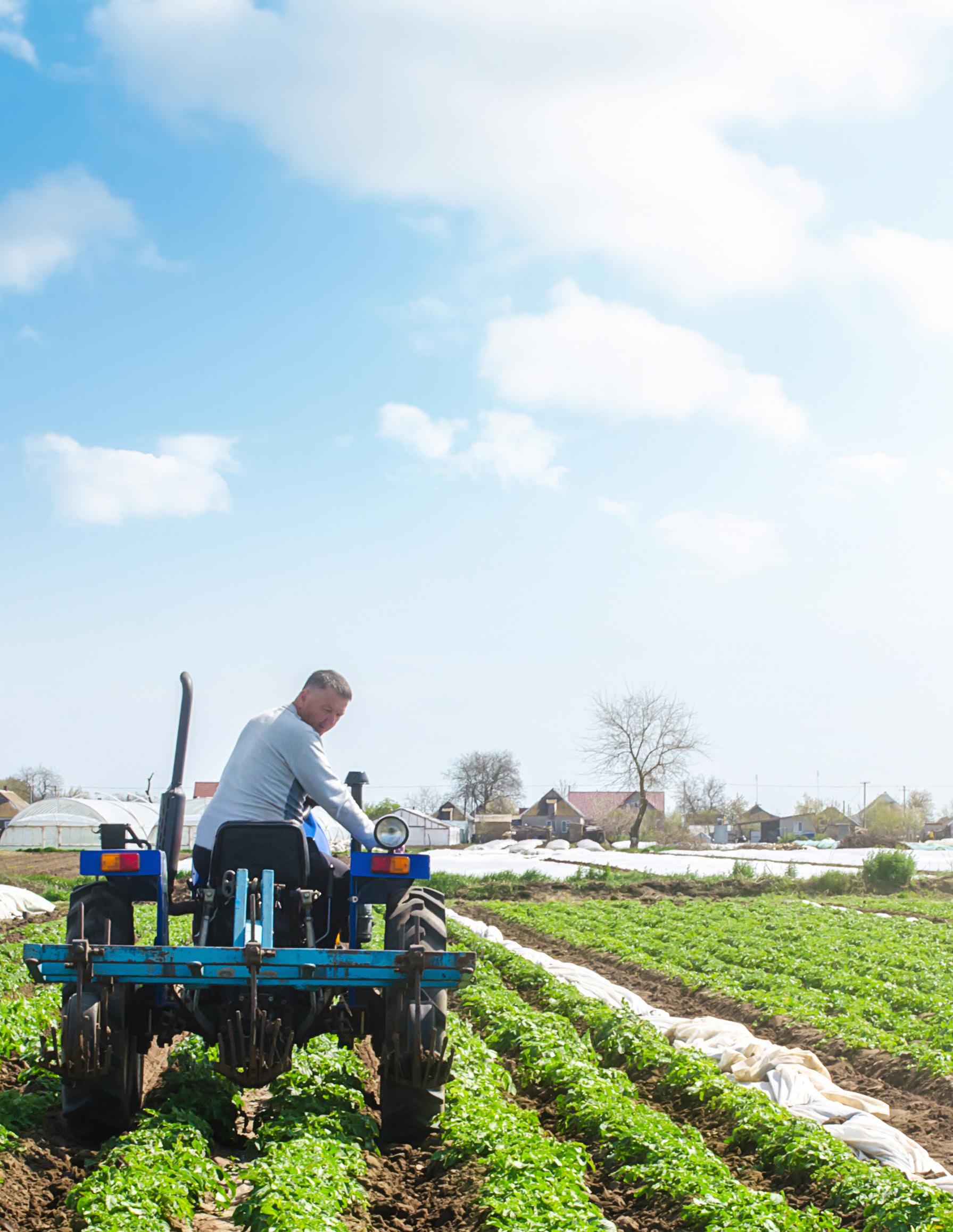
KNOW YOUR COST TO GROW
In 2022, with a two-year grant from the Southern Sustainable Agriculture Research and Education’s Professional Development Program, we began work with a cohort of agricultural service providers to make our Know Your Cost To Grow (KYCTG) Program available to farmers in six Southern states.
The KYCTG Program was developed through our partnership with Oregon State University’s Center for Small Farms and Community Food Systems. This program focuses on supporting multi-crop vegetable farmers in determining their crop-specific costs of production, and then creating a framework for using these costs of production to increase their farm’s profitability. We are pleased to be collaborating on this project with Alcorn State University School of Agriculture and Applied Sciences, Mississippi Small Farm and Agribusiness Center, Florida Agricultural and Mechanical University, Georgia Organics, Louisiana Central, SPROUT New Orleans, and Tuskegee University. We plan to train agricultural service providers and educators from these organizations to use the KYCTG Program to enable the farmers they work with to make informed decisions that will keep them successful for the long-term.
26 GROWTH & IMPACT REPORT - OREGON TILTH
Oregon Tilth understands that to build a better food system, we need farms that are biologically sound, socially equitable, and economically viable.
“The Southern SARE funded project ‘Training Agriculture Professionals and Educators to Support Diversified Vegetable Farmers with Cost Analysis’ is important to me and the farmers I work with because financially sustainable farms are a MUST if the deep south is going to experience food security, food equity, and economic justice. This program helps farmers understand the value of their most precious resource, their time; as well as ensure they are capturing fair market prices for their crops.”
– Bahia Nightengale at Louisiana Central



“Farmers need to know which crops are making them profitable, but very few have the resources and time to tackle the daunting execution of a crop cost analysis or enterprise budget. The ‘Training Agriculture Professionals and Educators to Support





Diversified Vegetable Farmers with Cost Analysis’ project has given us (Georgia Organics) a tool to make this vital piece of farm business planning a manageable task that can occur within one growing season. The farmer we are working with will be able to know in 6 months’ time the labor cost and economic viability of two of his wholesale crops.”
– Lydia Hsu, Georgia Organics
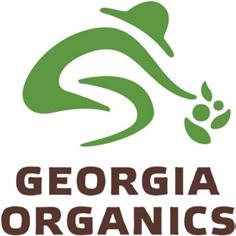



Know Your Cost to Grow Train-the-Trainer
27 GROWTH & IMPACT REPORT - OREGON TILTH
Tanya Murray Farm Viability Specialist
OUR FISCAL COMMITMENT TO CONTINUOUS IMPROVEMENT
“Every year we strive to create a positive client experience,” said Finance and Administration Director Renee Kempka. “We’ve always worked closely with state agriculture departments and the Farm Service Agency offices to streamline the organic certification cost share program process for our clients.”

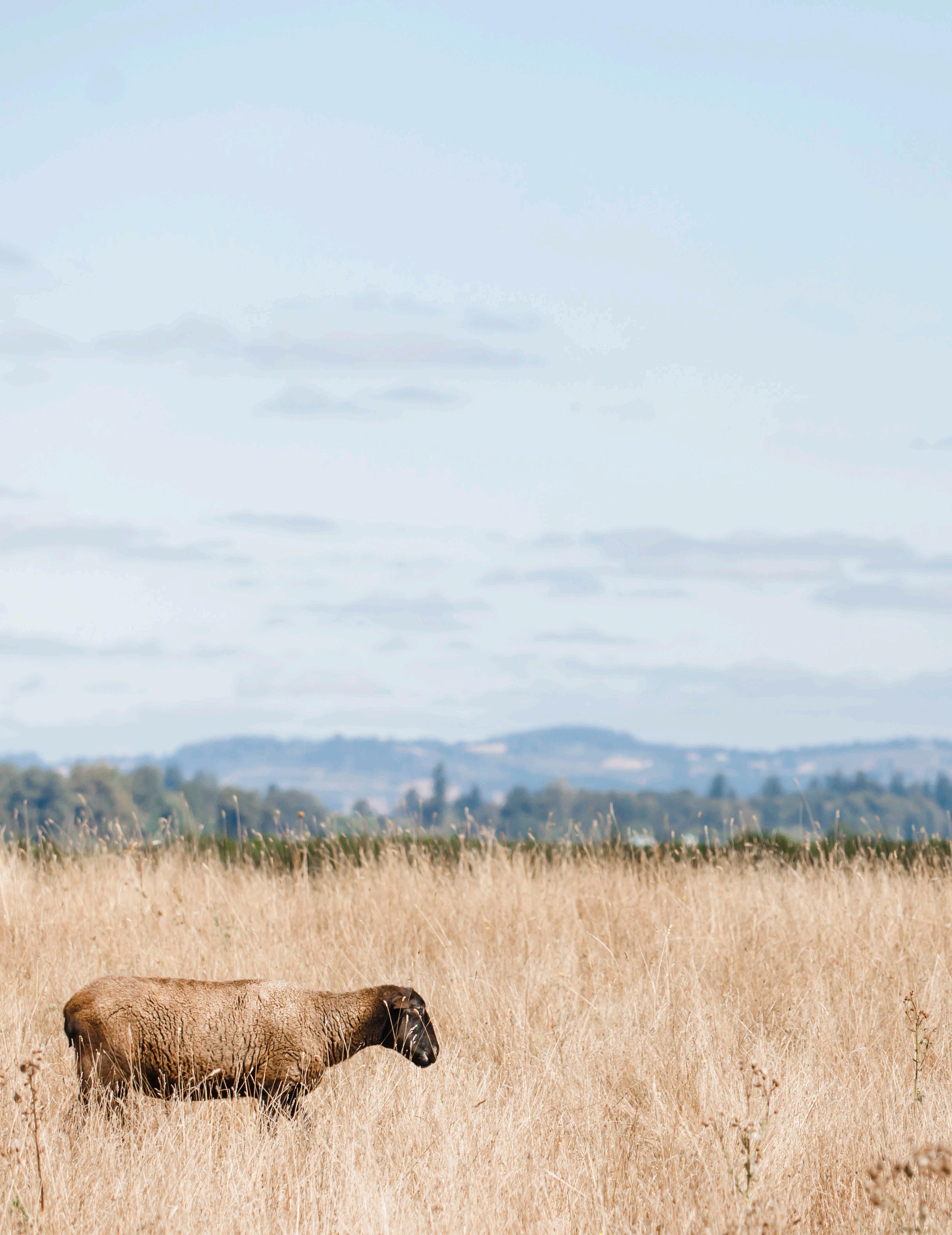 Renee Kempka Finance and Administration Director
Renee Kempka Finance and Administration Director
28 GROWTH & IMPACT REPORT - OREGON TILTH
The finance and administration team is the nexus of Oregon Tilth. The team is connected to every department and every client, managing all aspects of funds going into and out of the organization, from deposits and payments to invoices and bills paid. The finance team is motivated by continuous improvement and the opportunity to serve clients and staff. Each year, the team analyzes prior years’ information and data to provide clients with the best service possible.

This year the finance and administration team identified a need to create a better invoicing process for Tilth clients based in Mexico.

The process started with creating a new invoicing system using the Mexican peso currency. The team then developed a separate fee schedule in pesos, which is more transparent for clients. Finally, creating a new fee schedule addendum, the team adjusted the Mexico fee schedule to make inspection services more affordable. This is primarily due to the fact that our Mexican clients must pay an additional government mandated 16% Value Added Tax on all invoices.

For our United States based clients, the finance team facilitated more support for the Organic Certification Cost Share Program.
Providing additional information and streamlining the overall process helped more clients obtain reimbursements for their certification expenses. With the assistance of Tilth’s marketing and communications department, Finance and Administration revamped invoices, and created new stationery with easy-access QR codes and a link for clients to get information about Cost Share. We received positive feedback from Farm Service Agencies and state agencies about our improved process.

29 GROWTH & IMPACT REPORT - OREGON TILTH
Oregon Tilth’s finance and administration team is committed to continuous improvement and providing the best possible service to clients and staff.
Left to right: Payroll and Benefits Specialist Cindy Harkey, Finance and Administration Director Renee Kempka, Finance Administrator Karrianne Heide, Finance and Administration Administrator Jacob Messer, Accounting Supervisor Mickenzie Chase, Administrative Assistant Kettie Adams.
REVENUE
REVENUE
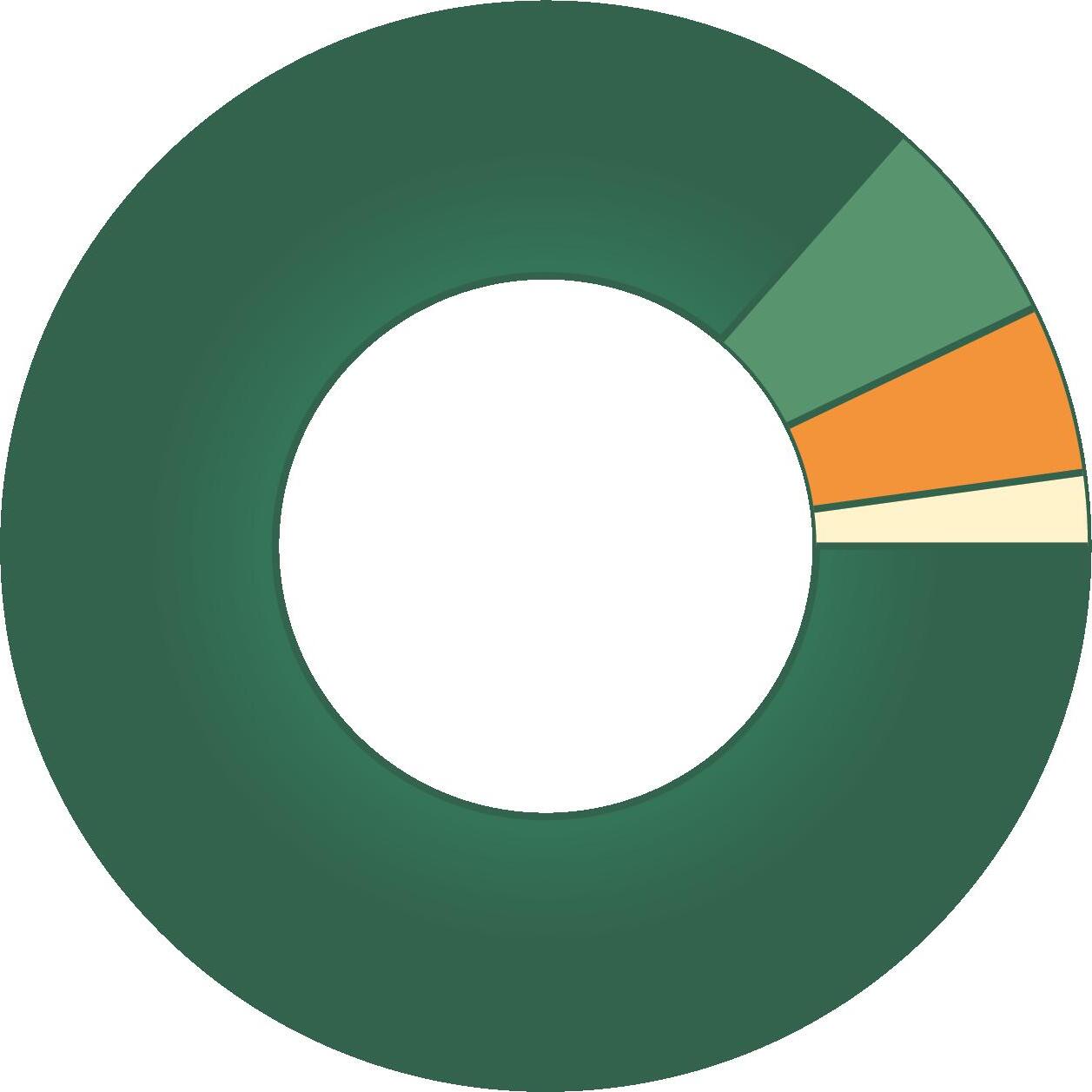
Domestic Certification
Latin America Certification
Grants & Donations
Interest & Other
FUNCTIONAL EXPENSES
FUNCTIONAL EXPENSES Certification

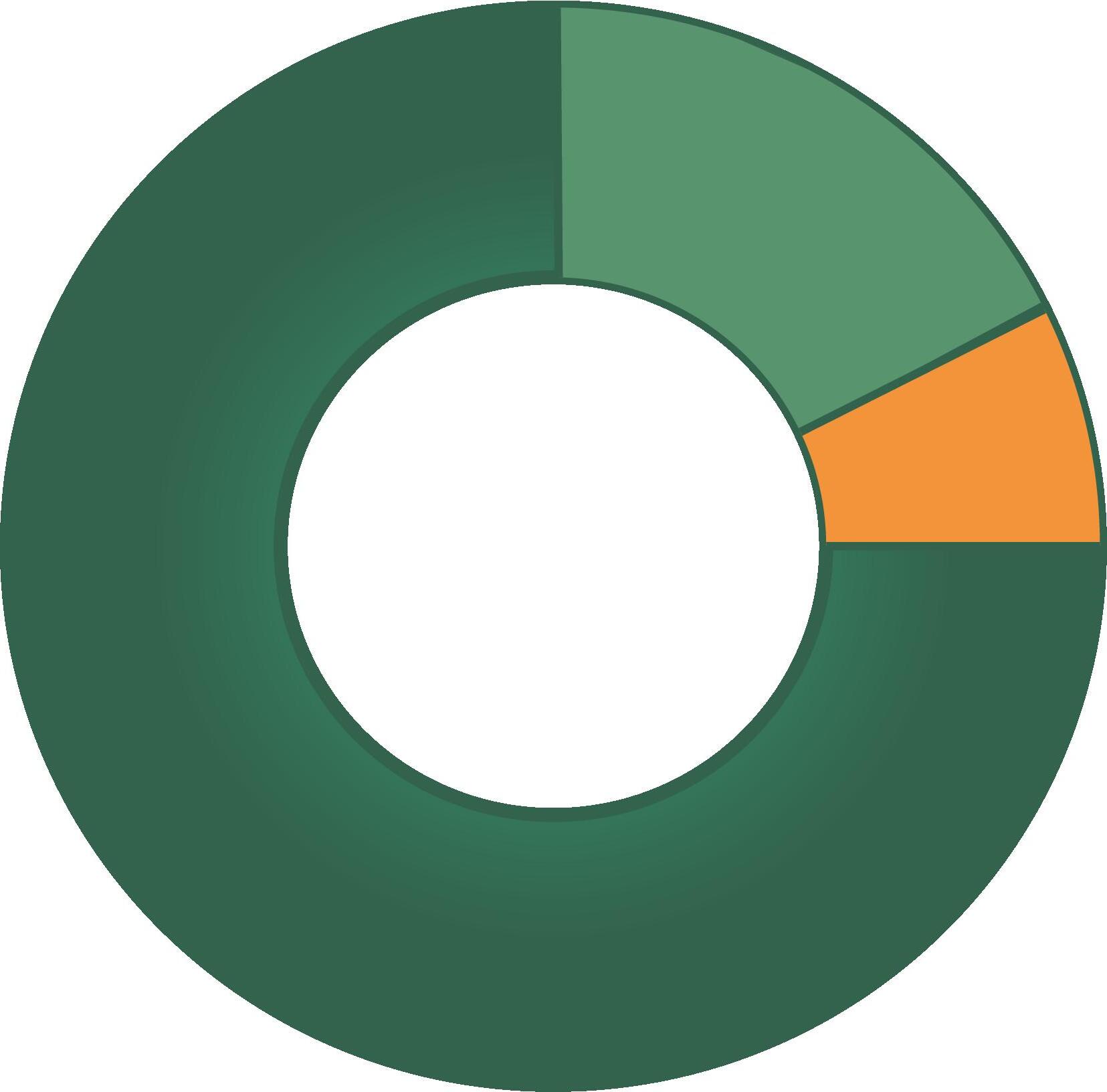
Administrative & General Education, Advocacy, Outreach
Gresham,
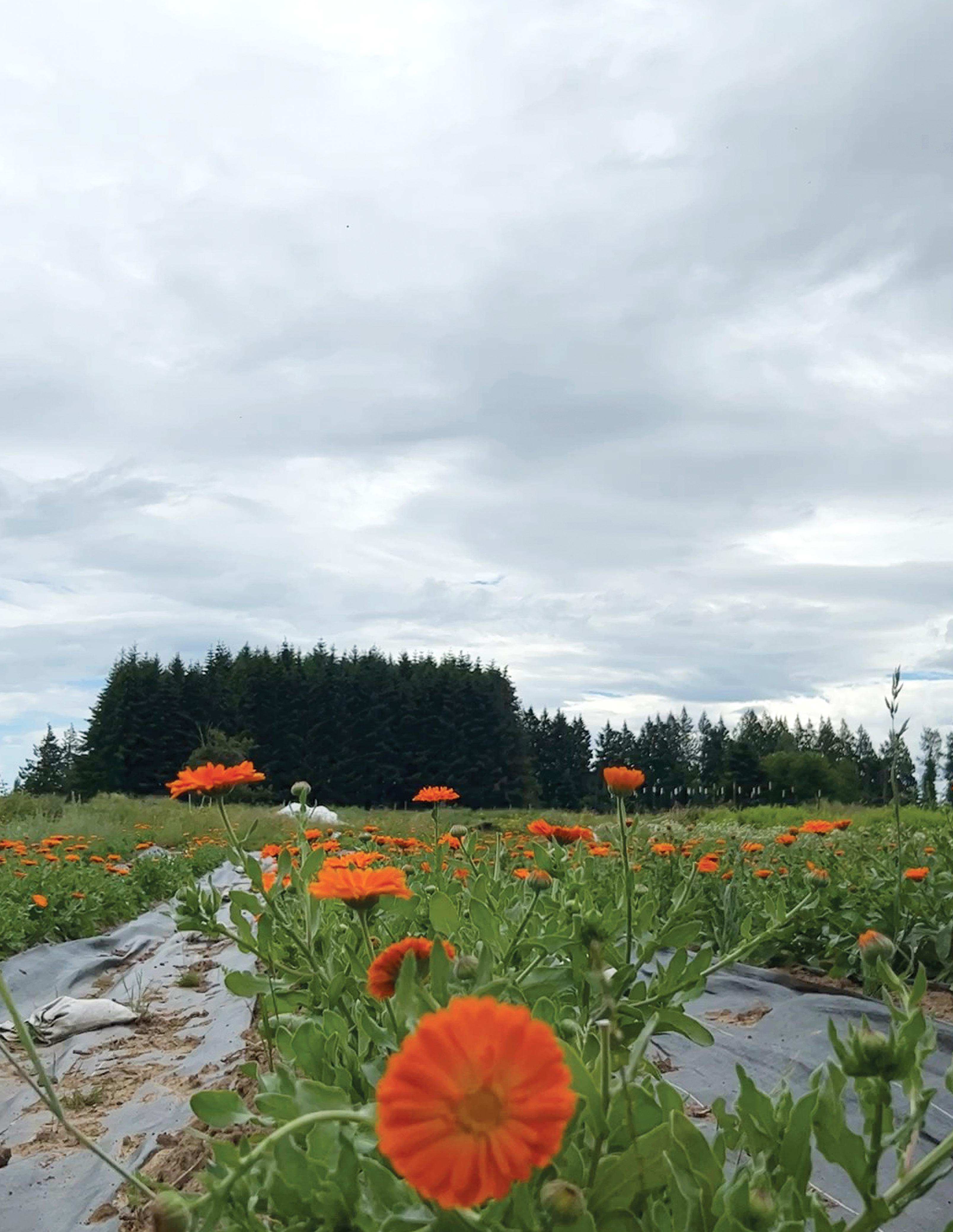
30 GROWTH & IMPACT REPORT - OREGON TILTH 87% 5% 6% 75% 7% 18%
Up Remedies
Oregon 2%
Rise
STATEMENT OF FINANCIAL POSITION

2022 FINANCIALS
NET
STATEMENTS OF OPERATIONS (Unaudited)
CONSOLIDATED
ASSETS TOTALS 2022 Cash & Cash Equivalents $ 3,119,760 Receivables 1,942,272 Prepaid Expenses 221,174 Investments 7,774,968 Other Assets 19,994 Property & Equipment 36,456 Total Assets $ 13,114,625 LIABILITIES Accounts Payable $ 67,487 Notes PayableAccrued Liabilities 603,285 Deferred Revenue 2,873,225 Total Liabilities $ 3,543,997
ASSETS Without Donor Restrictions Undesignated $ 1,651,977 Board designated endowments 7,774,968 Board designated for projects 143,683 With Donor RestrictionsTotal Net Assets $ 9,570,628 Total Liabilities & Net Assets $ 13,114,625 STATEMENT OF ACTIVITIES REVENUE TOTALS 2022 Domestic Certification $ 8,895,325 Latin America Certification 653,825 Donations, Grants & Sponsorships 515,379 Interest & Other 215,892 Total Revenue $ 10,280,421 EXPENSES Certification $ 7,820,229 Administrative & General 1,907,450 Education, Advocacy, Outreach 714,007 Total Expenses $ 10,441,686 Net Ordinary Income $ (161,266) 31 GROWTH & IMPACT REPORT - OREGON TILTH

We work to support and promote biologically sound and socially equitable agriculture. Oregon Tilth Main Office tilth.org 503-378-0690 organic@tilth.org Oregon Tilth Mexico Office esp.tilth.org (52)-452-255-0953 mexico@tilth.org
 A farmer in Evansville, Indiana, talks with a Natural Resources Conservation Service team leader.
Photo courtesy of the United States Department of Agriculture.
A farmer in Evansville, Indiana, talks with a Natural Resources Conservation Service team leader.
Photo courtesy of the United States Department of Agriculture.





 FROM
FROM




 CONNIE KARR CERTIFICATION DIRECTOR
CONNIE KARR CERTIFICATION DIRECTOR



 Back row left to right: Connie Karr, former Executive Assistant, now, Tilth’s Certification Director; Anne Plato, former Processing Program Reviewer; Lori Cozby, former Accounts/Finance Manager; Chris Schreiner, former Farm Coordinator, now, Tilth’s Executive Director. Front row left to right: Yvonne Frost, former Executive Director; Patti Conway, former Processing Program Coordinator; Jane Archer, former Education and Garden Coordinator.
Back row left to right: Connie Karr, former Executive Assistant, now, Tilth’s Certification Director; Anne Plato, former Processing Program Reviewer; Lori Cozby, former Accounts/Finance Manager; Chris Schreiner, former Farm Coordinator, now, Tilth’s Executive Director. Front row left to right: Yvonne Frost, former Executive Director; Patti Conway, former Processing Program Coordinator; Jane Archer, former Education and Garden Coordinator.























 Heather Smith IT Director
Heather Smith IT Director














































 Renee Kempka Finance and Administration Director
Renee Kempka Finance and Administration Director







